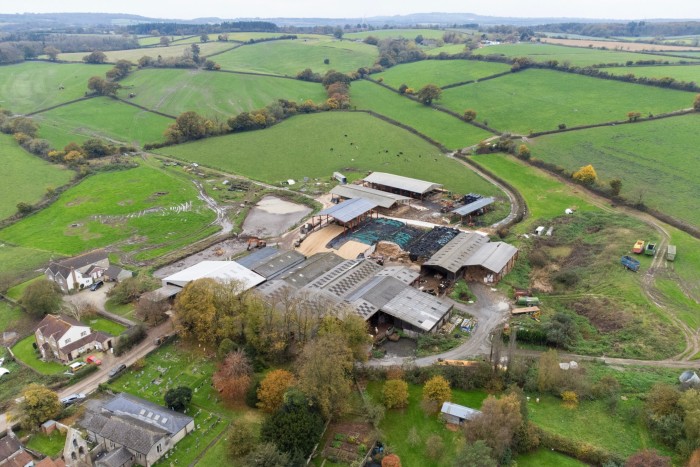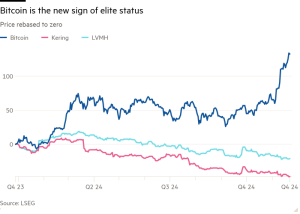Farmers lose sleep over Budget inheritance tax crackdown

Nick Hutton, a 46-year old dairy farmer in Somerset, is worried he will be lumbered with unaffordable death duties after the UK government this week introduced a shock cap on inheritance tax relief for agricultural assets.
Chancellor Rachel Reeves said during her Budget on Wednesday that farmers with assets worth more than £1mn will have to start paying death duties from April 2026, as part of a broader crack down on inheritance tax loopholes.
Hutton, of New Manor Farm near Frome, said he agreed with the intention behind the changes, and was infuriated by “city people” abusing the tax reliefs in his county, but that the chancellor had not thought through all the consequences.
“There are thousands of farmers who didn’t sleep last night because they are worrying that their children are going to be in a horrible situation if they pop their clogs,” Hutton said.
Chancellor Rachel Reeves’ decision to cap inheritance tax relief on agricultural assets has led to a noisy public outcry from farmers, prompting plans for protests in the capital as furious trade groups rally to overturn the reforms.
The National Farmers Union and the Country Land and Business Association have warned that the changes will herald the end of the family farmING in the UK, force small rural businesses to sell their assets and undermine the country’s food security. The NFU has set a date for a “mass lobby” on November 19 in central London.
Farmers and agricultural experts that spoke to the FT argued, however, that while the changes would hit some farmers hard, they could be offset with good succession planning. Wealthy families and absentee landlords buying farmland to dodge inheritance tax meanwhile should have to pay their fair share, they said.
Hutton’s father is in the process of handing down the farm to his two sons. But if he dies within seven years, Hutton and his brother will have to pay inheritance tax at 20 per cent of the farm’s value, save for the £1mn that falls under the relief.
While their dairy herd is valued at about £2mn, and the land and buildings at a further £2mn, the farm earns just £35,000 in profits a year, which Hutton splits with his brother.

Rob Hitch, agricultural accountant at Dodd & Co, said the reforms fundamentally changed how farmers would need to approach their succession planning, but were not a death knell for the sector. Most farmers, he said, would be able to pass on their assets to their children during their lifetime in order to reduce the size of their estate at death, thereby lowering the tax bill.
“The problem group who will be affected by this most are those over 75 who still hold substantial farming assets,” said Hitch.
Farmers can gift agricultural assets while they are alive, but if they die within seven years of the gift, or if the recipient sells the property before the donor’s death, inheritance tax is then due.
A solution to this, he said, would be to allow farmers above a certain age, for example 70, to still make gifts for a short period while benefiting from the old rules.
“Once the shock has subsided, many will work out that with planning, a family farm can minimise IHT,” said Julia Aglionby, agricultural valuer and professor at the University of Cumbria.
Aglionby argued that this could be positive for the next generation, as farmers currently “hung on to control into their 80s leaving their middle-aged children working on less than the minimum wage, unable to innovate”.

Ministers and some tax experts have argued that the outcry from farmers is over the top. On Friday, environment and food minister Steve Reed defended the reforms, criticising “misleading headlines” claiming that family farms will pay the price. “Only the richest estates will be asked to pay,” he wrote in a column in The Telegraph.
Paul Johnson, director of the Institute for Fiscal Studies, told Sky News that the complaints were “massively overdone”. “This affects a very small number of farms each year. They’re still going to be better treated than anyone else in terms of inheritance tax,” he said.
Agricultural property relief (APR) and business property relief (BPR) were designed to ensure the survival of family and farm businesses after the owner’s death. But according to tax experts, the policies overwhelmingly benefit the country’s largest estates.
The IFS found that the reliefs are most heavily used by the largest estates, with 90 per cent of business assets passed on as part of estates worth over £2mn. But the NFU has countered that most farmers were asset rich because of high land values, but cash poor, so the cap was still far too low to protect family businesses.
Hutton, of New Manor Farm, said that while the government’s intentions were good, he did not believe that the reforms would close loopholes such as the placing of assets into trusts to avoid IHT, something “true farmers” were not in a position to do, as many used their farms as collateral for loans.
Financier and environmentalist Ben Goldsmith, who is rewilding parts of his a 300-acre farm near Bruton in Somerset, said absentee landowners farming the land under contract just to avoid inheritance tax were creating “depressing landscapes”.
Both Hutton and Goldsmith said the practice of wealthy landowners outsourcing farming to large agricultural or forestry contractors through “profits à prendre” agreements was rife in the area.
The arrangement allows a landowner to grant access to a farmer to farm without having to form a tenancy agreement. Hutton said he had been approached four times by landowners seeking such an arrangement.
“The heritage relief has been a little bit abused,” said Goldsmith, arguing that there should be a public good condition attached to it such as meaningful heritage protection, public access or nature recovery. “If they are going to take advantage of that relief, they should have to earn it.”
A recent analysis by the Centre for the Analysis of Taxation (CenTax) found that more than two-thirds of APR went to around 200 UK estates a year, with each claiming more than £1mn in relief on an average estate value of £6mn.
“There is a massive difference between me, who gets up at 4am and finishes at 9pm, seven days a week, earning less than 20k a year, and somebody who has made their money outside farming, retired to the country at 45, bought a farm for £5mn, has two horses, five sheep and a set of accounts that say they a farmer,” said Nick Hutton.
“We are not the same people. The definition of a farmer is what I think really needs addressing.”
#Farmers #lose #sleep #Budget #inheritance #tax #crackdown






